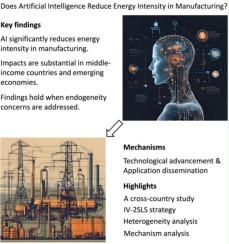Does artificial intelligence reduce energy intensity in manufacturing? Evidence from country-level data
IF 14.2
2区 经济学
Q1 ECONOMICS
引用次数: 0
Abstract
This paper examines the impact of artificial intelligence (AI) technology on the energy intensity of manufacturing industries using cross-country analysis. The findings reveal that AI adoption significantly reduces energy intensity in manufacturing, underscoring its potential for energy savings. To mitigate endogeneity concerns, the Bartik instrument variable method is used and the key findings are held. We further document substantial heterogeneity across economic contexts. Specifically, in high-income countries and developed economies, especially in G7 and European Union countries, AI application does not significantly reduce energy intensity. However, in middle-income countries and emerging economies, particularly in European emerging markets, AI adoption leads to a substantial decrease in energy intensity. Furthermore, we reveal that AI enhances energy efficiency through technological advancement and application dissemination. Based on these findings, we offer practical policy recommendations for promoting the sustainable development of the AI-energy intensity nexus in manufacturing.

人工智能能降低制造业的能源强度吗?来自国家层面数据的证据
本文通过跨国分析,考察了人工智能技术对制造业能源强度的影响。研究结果显示,人工智能的采用显著降低了制造业的能源强度,凸显了其节能潜力。为了减轻内生性问题,使用了Bartik仪器变量方法,并保留了关键发现。我们进一步证明了经济背景下的巨大异质性。具体而言,在高收入国家和发达经济体,特别是G7和欧盟国家,人工智能的应用并没有显著降低能源强度。然而,在中等收入国家和新兴经济体,特别是在欧洲新兴市场,人工智能的采用导致能源强度大幅下降。此外,我们揭示了人工智能通过技术进步和应用传播来提高能源效率。基于这些发现,我们提出了切实可行的政策建议,以促进制造业中人工智能能源强度关系的可持续发展。
本文章由计算机程序翻译,如有差异,请以英文原文为准。
求助全文
约1分钟内获得全文
求助全文
来源期刊

Energy Economics
ECONOMICS-
CiteScore
18.60
自引率
12.50%
发文量
524
期刊介绍:
Energy Economics is a field journal that focuses on energy economics and energy finance. It covers various themes including the exploitation, conversion, and use of energy, markets for energy commodities and derivatives, regulation and taxation, forecasting, environment and climate, international trade, development, and monetary policy. The journal welcomes contributions that utilize diverse methods such as experiments, surveys, econometrics, decomposition, simulation models, equilibrium models, optimization models, and analytical models. It publishes a combination of papers employing different methods to explore a wide range of topics. The journal's replication policy encourages the submission of replication studies, wherein researchers reproduce and extend the key results of original studies while explaining any differences. Energy Economics is indexed and abstracted in several databases including Environmental Abstracts, Fuel and Energy Abstracts, Social Sciences Citation Index, GEOBASE, Social & Behavioral Sciences, Journal of Economic Literature, INSPEC, and more.
 求助内容:
求助内容: 应助结果提醒方式:
应助结果提醒方式:


